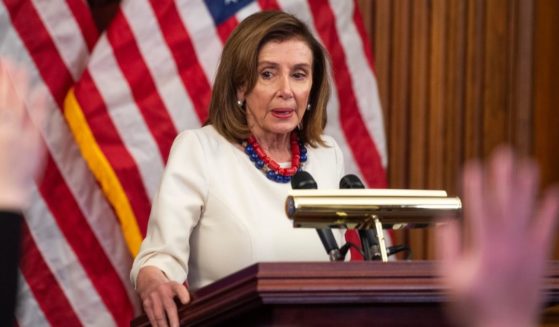
In the midst of discussions concerning the possibility of prohibiting Congress members from trading in the stock market, former President Donald Trump has added his voice to the mix.
The 45th president has singled out Democratic House Speaker Nancy Pelosi particularly, saying that she should not be allowed to keep trading individual stocks.
Recently, it was discovered that dozens of members of Congress had violated the Stop Trading on Congressional Knowledge Act of 2012 by not disclosing their financial trades. There were 54 members who failed to properly report their trades, Insider reported.
The STOCK Act was passed to limit potential conflicts of interest and to encourage congressional members to be transparent about their personal finances.
But since it was discovered that so many members were violating the act, there is now a bipartisan effort to ban senators and representatives from trading individual stocks in the stock market altogether, according to NPR.
Democratic Sens. Jon Ossoff of Georgia and Mark Kelly of Arizona, along with Missouri Republican Sen. Josh Hawley, have reintroduced the legislation to ban congressional stock trading, Newsweek reported.
“Year after year, politicians somehow manage to outperform the market, buying and selling millions in stocks of companies they’re supposed to be regulating,” Hawley said in a statement. “Wall Street and Big Tech work hand-in-hand with elected officials to enrich each other at the expense of the country.”
Those who support the measure argue that it would stop members of Congress from using classified information to make money in the market.
But Pelosi quickly showed her opposition to the measure by saying, “We are a free market economy. They should be able to participate in that,” NPR reported.
Following her comments, Trump fired back at Pelosi and accused her of insider trading and being entirely untrustworthy.
“She has inside information. It’s not right. It’s not appropriate. It shouldn’t be,” Trump told Breitbart News.
“I happen to watch her and see her and dealt with her a lot and I think she’s clever in one way and stone cold crazy. She should not be allowed to do that with the stocks. She should not be allowed to do that. It’s not fair to the rest of this country,” Trump added.
Even The New York Times jumped on Pelosi for her comments in an opinion piece headlined, “Congress Can Trade Stocks or Keep the Public Trust. Not Both.”
“This is indeed a free-market economy. It is also one that a growing number of Americans feel is not working for them. Combine that with the public’s aforementioned grim view of politicians, and you can see where Ms. Pelosi’s remark might be considered a wee bit out of touch,” Michelle Cottle wrote for the Times.
Contrary to Pelosi’s position, polls show support for the new effort to stop individual trading, according to Kedric Payne, the general counsel for the Campaign Legal Center.
“Members of Congress are finally seeing that the public wants to know that they are not acting in their own personal interests when they make official decisions,” Payne told NPR.
Several prominent Republican lawmakers have voiced their support for the measure as well.
House Minority Leader Kevin McCarthy said that he does not trade individual stocks and sees how the American people would be suspect of congressmen doing so.
“I cannot imagine being a speaker of the House with the power of what can come before committee, you name them and what can come to the floor and trading millions of dollars worth of options. I just don’t think the American people think that’s right,” McCarthy told NPR earlier in January.
With an already-strong mistrust in politicians, it makes sense that the public would now be doubtful of how congressmen are trading. While the STOCK Act was a step in the right direction to try to stop insider trading and regulate Congress members, it clearly didn’t work since so many were found to regularly flout the rules and not disclose their profits.
With the public’s trust in their elected officials at stake, it may really be time to stamp out congressional stock trading once and for all.
